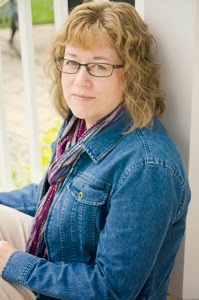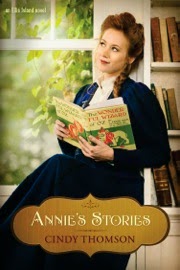Cindy Thomson is a writer and an avid genealogy
enthusiast. Her love of history and her Scots-Irish heritage have inspired much
of her writing, including her new Ellis Island series. Cindy is also the author
of Brigid of Ireland and Celtic Wisdom: Treasures from
Ireland. She combined her love of history and baseball to co-author the
biography Three Finger: The Mordecai Brown Story, which was a
finalist for the Society for American Baseball Research's Larry Ritter Book
Award. In addition to books, Cindy has written on a regular basis for numerous
online and print publications and is a mentor for the Jerry B. Jenkins
Christian Writers Guild. She is also a member of American Christian Fiction
Writers and the Historical Novel Society. Cindy and her husband have three
grown sons and live in central Ohio. Visit her online at www.cindyswriting.com.
What sparked
the story?
I’ve always been interested in learning more about my ancestors.
While none of mine, that I know of, came through Ellis Island, it’s estimated
40% of Americans today have an ancestor who came through Ellis Island. This era
of massive immigration is a part of the history of all Americans. I wanted to
tell stories about the struggles, the fears, the doubts, and the triumphs these
people lived through.
What would you do differently if you were starting your publishing
career today?
Today is much different with electronic publishing and many more
options than when I started. I still would pursue traditional publishing, but I
think knowing what I know now, I would study the craft more before trying to
get published.
Share a bit of
your journey to publication.
My first novel was published in 2006. Since then I’ve published
some non fiction books, but no more novels until I got the call that Tyndale
wanted my Ellis Island series. Historical fiction was my favorite genre, but
for seven long years I feared I might never have another novel published. At
the same time, I felt I had to try. The writing life is an odd combination of
struggle, anguish, pleasure, and joy. It’s the creative process that we have to
live through, but once we get our stories into the hands of readers, it’s well
worth it.
Where do you
write: In a cave, a coffeehouse, or a cozy nook?
I love my office. We’ve lived in this house for the past six years
and this has been my best place to write. It’s the only upper room, reached by
a spiral staircase. We have a wooded lot and I feel like I’m in a tree house.
However, it’s hot in the summer. I have a window air conditioner that helps but
when the weather’s nice I take my laptop outside to the deck. So far I’ve
failed at writing at coffee shops. I know a lot of writers do that, but I do
better with few distractions.
What would you
do if you didn't write?
I use to teach, but I’m not sure I could go back to that now, at
least not with the little ones. It takes so much energy! I mentor writers
online through the Jerry B. Jenkins Christian Writers Guild, and I really enjoy
that. I’d probably teach again on some level or….just read a lot! But truly I can’t stop writing. It’s what I have to
do.
What issue
makes you struggle as an author? How do you handle it?
Organizing my time. Freelancing is challenging even though it’s
rewarding being able to make your own schedule. I have found I have to have a
calendar with reminders. That way I’m not stopping to ask myself what task I
should do next.
What are your
top 3 recommendations for a new writer?
1.
Don’t rush to publication. It’s so easy to do that these days, but
there is value in taking the time required to learn how to write well. A
well-written book will survive much better in the competitive marketplace we
have today.
2.
Attend conferences. I can’t recommend this enough. Not only will
you learn tons about the craft and business, but you will also connect with
writer friends, which is so important. In addition you’ll meet industry
professionals like editors and literary agents, and you are not likely to meet
them anywhere else.
3.
Read. Read a lot. Read all genres, not just those you write. I’ve
heard the argument from people who are afraid they’ll end up writing like the authors
they are reading rather than establishing their own voice. I really don’t think
that’s a valid argument, not if you’re reading more than one author. You can
learn so much by reading really good writing. And if you want to write a book,
surely you like to read. If not, I’d say find another occupation.
Some say a
writer is born and others say anyone can learn. What do you think?
I think it’s not an easy argument to resolve. There is plenty to
learn, and any writer can improve his/her writing by working at it. But I don’t
believe just anyone can tell stories well enough to write a good novel. I can’t
tell which new writer that applies to, though. I think if you’re driven to
write and have a strong desire to have people hear your stories, then you
should work at it. If you don’t have that strong of a desire, do something else
because it’s not an easy journey.
What's the
strangest or funniest experience you've had in writing?
I don’t know if I can come up with one single thing. So much about
writing is strange and funny! Research trips have resulted in some strange
occurrences, like having a rat run past you in Battery Park, Manhattan, and
knowing that was going to happen to your character. It’s strange when you hear
your characters talking in your head and you can’t tell anyone lest they think
you’re nuts. Or you can’t go to sleep because a scene is playing out in your
head.
Do you prefer
the creating or editing aspect of writing? How do you feel about research?
Of course I have to have all of that, so I don’t know if I prefer
one over the other. But it does seem to be more fun to have the story written
and go back to fix what’s wrong and what doesn’t work. I love, love research.
Maybe more than writing.
Do you consider
yourself a visual writer? If so, what visuals do you use?
I think so. I like to have maps, photographs similar to what I
think my characters look like (Tyndale got such a great match for Annie’s
Stories’ cover.) I like old photographs, and I have many on my Pinterest page.
I think it helps me put myself into their world.
What are your
writing rituals?
Basically, I get up, do a devotional and sometimes journal, answer
emails, check Facebook and Twitter, exercise, shower, and then settle down to
write. Usually. Like I said, I struggle a bit with time management.
Do you work
best under pressure or do you write at a leisurely pace?
I’m not sure. A deadline surely helps, but having the luxury of
time is wonderful.
What are your thoughts
on critique partners?
I had quite a few when I first started. It’s always good to have
another set of eyes on your work. Right now the most valuable to me are my fellow
authors who are willing to brainstorm with me.
Any final
thoughts?
It’s a privilege to have people read my books. Even though writing
is a tough occupation, it’s a labor of love that I enjoy and don’t take for
granted. Thanks for having me on Novel Rocket! I hope you all will visit me on
my Facebook page: www.facebook.com/cindyswriting
or Twitter: @cindyswriting
Annie's
Stories
The year is 1901, the literary sensation The
Wonderful Wizard of Oz is taking New York City by storm, and everyone
wonders where the next great book will come from. But to Annie Gallagher,
stories are more than entertainment—they’re a sweet reminder of her storyteller
father. After his death, Annie fled Ireland for the land of dreams, finding
work at Hawkins House.
But when a fellow boarder with something to hide is accused of misconduct and authorities threaten to shut down the boardinghouse, Annie fears she may lose her new friends, her housekeeping job . . . and her means of funding her dream: a memorial library to honor her father. Furthermore, the friendly postman shows a little too much interest in Annie—and in her father’s unpublished stories. In fact, he suspects these tales may hold a grand secret.
Though the postman’s intentions seem pure, Annie wants to share her father’s stories on her own terms. Determined to prove herself, Annie must forge her own path to aid her friend and create the future she’s always envisioned . . . where dreams really do come true.
But when a fellow boarder with something to hide is accused of misconduct and authorities threaten to shut down the boardinghouse, Annie fears she may lose her new friends, her housekeeping job . . . and her means of funding her dream: a memorial library to honor her father. Furthermore, the friendly postman shows a little too much interest in Annie—and in her father’s unpublished stories. In fact, he suspects these tales may hold a grand secret.
Though the postman’s intentions seem pure, Annie wants to share her father’s stories on her own terms. Determined to prove herself, Annie must forge her own path to aid her friend and create the future she’s always envisioned . . . where dreams really do come true.

























I agree, research is vital in historical or any genre. There's nothing worse than reading a book in which something happens that couldn't or wouldn't. Some things, one can get away with, but others - no way. :)
ReplyDelete